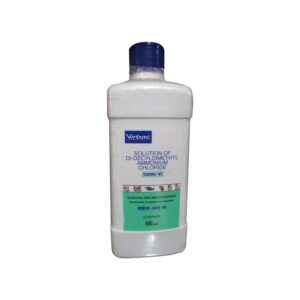DIDECYLDIMETHYL AMMONIUM CHLORIDE
DIDECYLDIMETHYL AMMONIUM CHLORIDE: DIDECYLDIMETHYL AMMONIUM CHLORIDE is a chemical compound commonly used as a disinfectant and antiseptic. It belongs to the class of quaternary ammonium compounds.
Use: DIDECYLDIMETHYL AMMONIUM CHLORIDE is primarily used in various industries, including healthcare, food processing, and water treatment, as a surface disinfectant. It is effective against a wide range of bacteria, viruses, fungi, and other microorganisms. In healthcare settings, it is often used to disinfect medical instruments, surfaces, and equipment. It is also found in consumer products such as disinfecting wipes and hand sanitizers.
Mechanism of Action: DIDECYLDIMETHYL AMMONIUM CHLORIDE works by disrupting the cell membranes of microorganisms, leading to the leakage of essential intracellular components and ultimately causing their death. It has both bactericidal (kills bacteria) and fungicidal (kills fungi) properties. It is also effective against lipid-enveloped viruses.
Dose: The specific dose of DIDECYLDIMETHYL AMMONIUM CHLORIDE may vary depending on the product and its intended use. It is important to read and follow the instructions provided by the manufacturer or healthcare professional. In healthcare settings, it is typically used in a diluted form as per specific guidelines. Different concentrations of the compound are available, generally ranging from 0.1% to 1%.
Side Effects: DIDECYLDIMETHYL AMMONIUM CHLORIDE can cause skin and eye irritation. Prolonged or repeated exposure to high concentrations may potentially lead to more severe skin reactions, including burns or dermatitis. Ingestion or inhalation of the compound can cause gastrointestinal upset, respiratory irritation, and, in severe cases, pulmonary edema. It is important to use appropriate protective measures, such as gloves and goggles, when handling this chemical compound to minimize the risk of adverse effects.
It is worth noting that the safety and efficacy of DIDECYLDIMETHYL AMMONIUM CHLORIDE in certain populations, such as pregnant women and children, have not been extensively studied. Therefore, caution should be exercised when using this compound in such cases, and the guidance of a healthcare professional should be sought.

